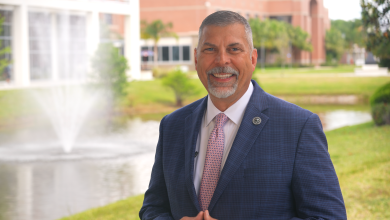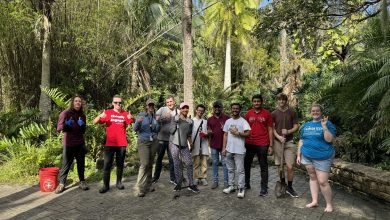Gaining Momentum: Florida Tech’s School of Computing is Coming of Age
by Christena Callahan
Florida Tech’s new School of Computing is coming into its own as an educational and research leader supporting the Department of Defense, the Department of Homeland Security and high-tech industry partners in computing collaborations.
It’s 2 p.m. on a Tuesday and, although classes are not yet in session, orientation is well under way. Still, nearly a dozen students are toiling away at workstations on the third floor of the Harris Center for Science and Engineering. Others are deep in conversation, standing amid two rows of cubicles, laptops in hand, a shelf of high-tech toys at their backs—robotic tanks, custom-built quadcopters, programmable radios.
Down the hall, another small group of students mans workstations surrounding a model train set. Tiny rails crisscross a tabletop and numerical labels mark junctions where a hobbyist might place a miniature tree or park bench. But these are no ordinary trains. Three prototypes round the tracks—each a student-built machine of circuits, microchips and cables propelling a smokestack camera down the rails. The team is conducting distributed systems research, high-level machine learning, running adaptive algorithms to allow the trains to coordinate with one another, optimize tasks and respond to changing circumstances.
The scene is the same whether it’s Friday night at 9 p.m. or Saturday morning at 10:30 a.m., summer break or spring term, says Marco Carvalho, executive director of the Harris Institute for Assured Information (HIAI).
“Students enjoy being here, working in the labs,” says Carvalho. “They are participating in funded research projects. They are coming up with their own solutions and contributing to the projects.”
The enthusiasm is evidence of the university’s growing prowess in the field of computing and burgeoning resources dedicated to enhancing its reputation as an educational and research leader in the field.
This summer, Carvalho took the helm of the Florida Tech School of Computing, an independent academic unit focused on degree programs in computer science, software engineering, cybersecurity, data sciences and computer information systems as well as a research unit, Harris Institute for Assured Information.
Computer sciences, Carvalho explains, spans the theory and practice of solving complex problems through computation, with immensely interdisciplinary applications—from statistical modeling for business applications to data mining in the biological sciences to mapping social dynamics in psychological studies. It is not surprising that traditionally instruction in these topics was established in departments where their benefit was most immediately felt.
“The formation of the School of Computing is an indicator that these disciplines have matured enough and have gained enough presence and inertia, both on the educational and the research sides, that it justifies bringing them together under the same organization,” he says.
The change is a transformational step for Florida Tech, who joins peer institutions like Drexel and Georgia Tech in establishing distinct schools of computing. It allows for greater interaction with other disciplines across campus, while also creating the opportunity for a more integrated growth plan.
“How can we build our students, our research and our service to the community in a more cohesive view of computing?” queries Carvalho. “As a dedicated school, we can take a more holistic view of computing education and research beyond the functional approach of simply applying a tool to a specific engineering or science application.”
Coming of Age
The School of Computing boasts a faculty of 22 and a student body just over 500. But the unit’s contributions in the research sector are most notable.
Currently managing funded research totaling $5.7 million, the School of Computing handles projects across the spectrum of computing disciplines from complex networks to visualization to security applications for the Department of Defense, the Department of Homeland Security, military labs and other industry partners. The school is designated as an NSA/DHS National Center of Academic Excellence in Information Assurance–Research, one of 10 universities in the country recognized for its significant engagement and dedication to information assurance research.
Students, from the undergraduate level and beyond, have the opportunity to participate on any of these projects, and they gain hands-on experience that translates directly to the workplace after graduation.
With the distributed systems research on model trains, for example, students build the machines, write the algorithms, test the software, and collect and analyze the data.
“The main benefit is that the students can focus on the research part of their project instead of building the environment from scratch,” says Adrian Granados, HIAI research associate.
And, practical applications are built into every facet of the curriculum.
In the network security class, for example, students construct fully operational virtual companies. Through the course of a semester, they mount cyber-attacks against competitor companies while defending their own—learning not only how to act, but how to recognize a malicious action on their own company’s servers.
“Because students use these tools and they see activity on the network that has specific signatures, they recognize that and can respond,” explains Carvalho. “Through this attack and defend process, they start to learn the traces that are only gained through experience.”
Such experience makes our students very desirable to future employers.
“There is a tremendous value and demand that industry and government place on our students,” says Carvalho, citing a nearly 100 percent employment rate post-graduation.
In fact, one of the school’s challenges is retaining students through the course of their studies who secure pre-graduation employment offers.
“It is not uncommon to see students being hired by industry before they finish,” explains Carvalho, “and we work with them to make sure they complete and finalize their studies.”
Not only are there employment opportunities available to the students, but these offers are coming from some of the industry’s leaders. Top companies looking for qualified employees look no further than the Florida Tech School of Computing.
Students from the School of Computing are highly sought after by top employers including Google, Facebook, Harris Corporation, Northrop Grumman and many other national and international companies, according to Dona Gaynor, director of Career Management Services at Florida Tech. “95 percent of students from the School of Computing are employed or enrolled in graduate school six months after graduation,” she says.
Poised for Growth
Beginning this fall, the computing-related undergraduate degree programs will restructure to include specializations in the areas of cybersecurity and data sciences.
“The decision to expand to different specializations, such as cybersecurity and data sciences, will allow students to receive an education focused in specific areas on the cutting edge of technology,” says Phillip Chan, professor of computer science and cybersecurity.
By fall 2017, the School of Computing will introduce a graduate degree in data sciences. This program will focus on the ways data can be analyzed and used to provide benefit to humans. Because of the increased prevalence of technology throughout, the amount of data being produced and stored has grown dramatically. This degree program will allow students to develop ways to effectively analyze that data and use it to provide benefit to users.
Ultimately, the school intends to offer doctoral programs in all the computing disciplines.
“The creation of the School of Computing will be a benefit to both the students, who will have a wider variety of opportunities in their degree, and the university as a whole, whose reputation of dedication to research and education will be strengthened,” says Heather Crawford, assistant professor of computer science and cybersecurity.





